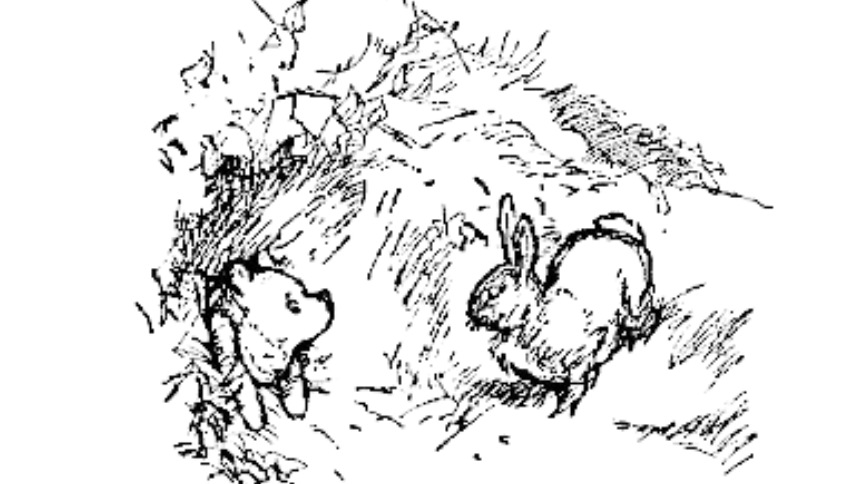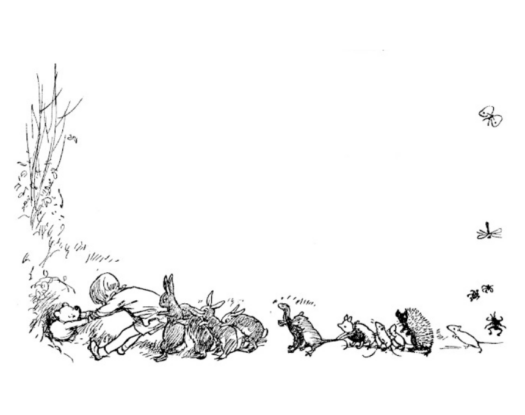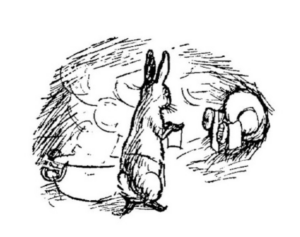Sometimes You’re a Wedged Bear in Great Tightness
By Natalie Hart | April 26, 2024 |

That is, you are stuck.
Whether you’re stuck because you got yourself in that situation or because of life circumstances…
Being stuck is kind of horrible
When Winnie-the-Pooh found himself stuck halfway in and halfway out of Rabbit’s front door (because he ate too much honey) he wasn’t thrilled:
“Oh, help!” said Pooh. “I’d better go back.”
“Oh, bother!” said Pooh. “I shall have to go on.”
“I can’t do either!” said Pooh. “Oh, help and bother!”
Things went from bad to worse when Christopher Robin decided that Pooh would have to stay there for a week without meals:
Bear began to sigh, and then found he couldn’t because he was so tightly stuck; and a tear rolled down his eye, as he said:
“Then would you read a Sustaining Book, such as would help and comfort a Wedged Bear in Great Tightness?”
I was recently a wedged bear and I can relate.
All I wanted was to be an empty nester. My children were in their early twenties, and I’d been single-parenting them for eight years. My marriage ended when my now-ex was arrested for a sex crime, so it’d been an intense eight years. Child 1 had moved out and I was focused on creating the conditions for Child 2 to follow, when Child 1 had to come back. I both love and like my children, I’m a pretty good parent of adults, and I always want to be a refuge for them, so none of this was the end of the world.
But it meant that I couldn’t take the next step in my life: sell my house and buy a new house with my boyfriend of 6 years so we could live together. We’d been talking about it for a year. And couldn’t make progress until my kids were on their own.
It was none of our fault that rents in our small city have skyrocketed, that employers like to promise near-full-time hours but not deliver, which makes it hard for young people to earn enough to afford not to live at home. I didn’t want to burden my children with my frustration–they were feeling stuck, too. So I was mostly keeping it all inside.
And then I cried in the grocery store on Super Bowl Sunday because I couldn’t find my boyfriend.
I am a middle aged woman. Generally rational and quite independent. A miscommunication about location usually made me laugh, but that day it was the last straw. I cried and blurted out how stressed out I was. It lasted no more than 30 seconds.
We wound up having a great afternoon and evening with my kids, but my boyfriend took my tears as a call to action I didn’t know I was making. He mobilized his network, which found a landlord with an available apartment. My children took it from there, got approved, and were moving out of their childhood home and into an apartment in their dream neighborhood within ten days.

Just like that, we were all unstuck.
Consider going uncharacteristic for your stuck characters
Are any of your characters stuck? How do they respond? Do they keep it all in? Or bash their head against the wall? Sneak around the wall? Deny that there is a wall? Convince themselves that they don’t even want the thing that they really want?
Does anyone try to take advantage of them while they’re stuck (like Rabbit hanging his washing on Pooh’s legs)?

What’s the thing that sets them free? Is it big? Or inconsequential? Do they lose it in a way that makes sense for them? Or is their response uncharacteristic?
If I cried about every miscommunication my boyfriend wouldn’t have noted the episode on Super Bowl Sunday and my kids and I might still be living together.
We writers spend so much time making sure that our characters have consistent personalities with actions that are well supported by their past experiences that we sometimes forget to give them uncharacteristic actions. To have them respond in a way that isn’t like them, so it makes them and others take notice.
Let’s also consider this irritating truth:
Getting unstuck can be kind of horrible
Yes, sudden freedom can be energizing and amazing. It definitely was for my kids. But I’m experiencing the discomfort of post-stuckness obsession.
As soon as they were moved out, I went into hardcore action, researching how to stage houses, how much houses in my neighborhood were selling for, making list upon list of jobs to do and things to fix and paint and hire people to do. Has my Zillow Zestimate changed? (After typing that I had to go check; it’s up $3,000 from two weeks ago.) Not to mention immediately hitting the work hard, barely coming up for air, relying on my chiropractor to keep me going after days of ceiling painting. My ability to concentrate has always been a strength, but now I’m somehow both laser-focused and terribly scatterbrained. Work on my writing has stopped so hard that I can’t even daydream about the story I’ve been working on for a year. I’m getting stress pimples. I yelled at my boyfriend for the first time. We’ve had an argument about me not wanting to move a desk I was going to sell out of the rain that involved me pleading, “Just let me not care.” I could barely talk about anything else for a month. The house is starting to look great, but I’ve discovered that obsession is not comfortable. At all.
Solve one problem and create another
That’s my favorite thing to say about parenting: as your children grow and change, each stage solves one problem and creates another.
I’m living that out for my own self, but we should also make sure that’s true in our fiction. Getting unstuck should complicate matters for your characters. Can it create more problems than it solves? Can it make them face uncomfortable truths about themselves? About the people around them? Did they learn anything from the experience of being stuck? Or did they refuse to learn? It’s at least another chance to have your protagonist act uncharacteristically and be forced to deal with those consequences.
In my work in progress that is not progressing until this house obsession wanes (it’s beginning to wane) the story starts when my protagonist does something uncharacteristic, not because he’s bad, but because he’s 12 and 12-year-olds are not perfectly responsible, even the very responsible ones. And when he doesn’t fess up to it, he gets more and more stuck, less and less able to admit to the truth. Until, of course, he’s forced to, and breaks the trust of the one person he could rely on to be supportive. Which makes him do something uncharacteristic that helps him find the thing he’d been responsible for losing. And I didn’t realize until now that acting out of character played such a pivotal role in the story.
Are any of your characters a Wedged Bear in Great Tightness? Are you? Does your protagonist do anything uncharacteristic? How does that play out in the story? How does getting what they want complicate matters? How do you free yourself from an obsession?
[coffee]









I enjoyed this post: your allusions to Pooh’s stuckness, you being stuck, and how we need to let our characters be stuck too. Kudos for taking a moment in your life and applying it to your writing!
Thank you, Carol. Always looking to learn :-)
I love this, Natalie! You had me at Winnie the Pooh, my first book love. And you reminded me that I need to make my characters do things that are, for them, uncharacteristic.
Good look with all facets of the move. Moving is the worst and often the best.
Thank you, Mary! And thanks for the good luck wishes. I’m going to need them. I haven’t moved in 26 years!
Thank you for this reminder of the great wisdom of the Winnie the Pooh books. I haven’t thought of them in a long time and it was a delight to do so. You have made some very good observations that I hope to incorporate in my writing!
Thank you, Kristin. Those Pooh books are so full of wisdom. I’m grateful for the repeated watching and reading my children demanded :-)
Hi Natalie, such an honest piece and relatable on many levels. I love all your Pooh references, that again underline the importance of a “simple story.” AA Milne spoke not only to children, but to the parents reading those amazing books. Your post also provides a pathway for problem-solving. Yes, we are sometimes unable to see an end to stuckness, that being part of the problem. But with wisdom and love, we can see things through. Enjoy your life, your home and your adult-children. Don’t lose any of it, IT’S ALL GOOD.
Thank you, Elizabeth. “Pathway to problem solving” — I love that phrase. Your “IT’S ALL GOOD” made me tear up a little. Thank you.
I too love Pooh. (Wow—I just made a rhyme, which is uncharacteristic!) I loved this post Natalie, in particular the notion that when we do something “uncharacteristic,” what we’re really doing is accessing a muscle that may well have been languishing unused, was in essence always there—and when, once expressed, can become characteristic with greater use. And that horror of solving one problem only to realize you’ve created another is very relatable. Much to ponder here, thanks!
Thank you, Kathryn. As usual, you take my ideas about uncharacteristic actions even deeper. I love it when you do that!
Excellent post. I could go on and on about how stuck things get no matter how much you try to not get things stuck, but right now it’s time for a little something….
Thank you, Michael. Enjoy your little something…
Thank you Natalie. I’m celebrating my current state of writerly stuck mess because you’ve reminded me how it is making me shimmy and reach. No doubt the worst brand of stuck is ‘Never Stuck.”
Torrie, I love that image of stuckness making us shimmy and reach and get creative. I’ll have to think over whether it’s worse to never be stuck–it’s too soon! But I suspect that you’re correct :-)
Most useful post, Natalie. Getting a character more and more stuck is a good writing exercise: What’s the best-laid-plan/worst-thing-that-could-happen? (I imagine a fly getting more and more entangled in a spider’s web the more it struggles to get out.)
Ooh, good image! Thank you.
You get away from the dreaded sophomore slump/saggy middle in a trilogy if you give a very satisfactory ending to the second volume – and leave the third volume to deal with, somehow, the giant flaming wreckage that ending caused.
It’s a delicious feeling: only the author knows what machinations have been set in motions already, and which need to be set up for the firehose, and you can make the readers go: Awww/Wait/What?
Worse than the worst HAS happened – now what the heck do we do with it?
And far more stuck than before – eventually for a good cause, but by unconventional means, which threaten the principled response that was happening before: Pooh would have to eat the cake he brought along, to comfort himself, and then realize he’s really made everything tighter, and he’ll need a miracle.
All the while hoping that the story has a believable conclusion, and that the reader isn’t seeing the steps, but they MUST be there.
If the hope is for the READER to feel emotional conflicts, we have to put the characters in them – with no way out.
We writers have all the fun.
Oooh, Alicia, that was inspiring, in a rubbing-hands-together-along-with-a-cackling-laugh kind of way. So many possibilities.
You took it exactly right.
I look for a particular response in my beta reader: “Alicia, you evil woman!”
It’s just what we’re always supposed to do: maintain tension, create problems, TEST our characters’ character.
LOVE IT!
I love this so much. You are clearly a writer having all the fun — and we get the fun of reading it!
Natalie, I just love that expression of being a “wedged bear in great tightness!” And I love that realization that we do sometimes act differently when in dire straits. I’m a plotter but I’ve discovered that when I give my characters free rein, they surprise me and usually take me in more interesting directions than what I would’ve planned for them. Here’s to Winnie and finding new paths out of sticky situations. Thank you for sharing your life lessons here.
Thank you, Vijaya. Indeed, here’s to finding new paths out of sticky situations, both real-life and writerly!
Natalie, wonderful post. I’ve had characters stuck, and I myself have sometimes been the one wedged in the doorway, unable to go forward or backward in the story. I love the advice about having them do something uncharacteristic. Or as Don Maass would say, “What’s the one thing your character would never do? Have them do it.”
Yes! You channeled the Don well.
I have always loved Winnie-the-Pooh (and in fact when I was little, Pooh Bear was my nickname from my dad). And I relate to being stuck and expecting to be free and then not. The summer my son moved out, my father moved in. All my expectations of writing/art time were swept away, and I haven’t fully recovered. How long will this situation last? I can’t say.
Thank you for sharing. Good luck on all house and writing things.